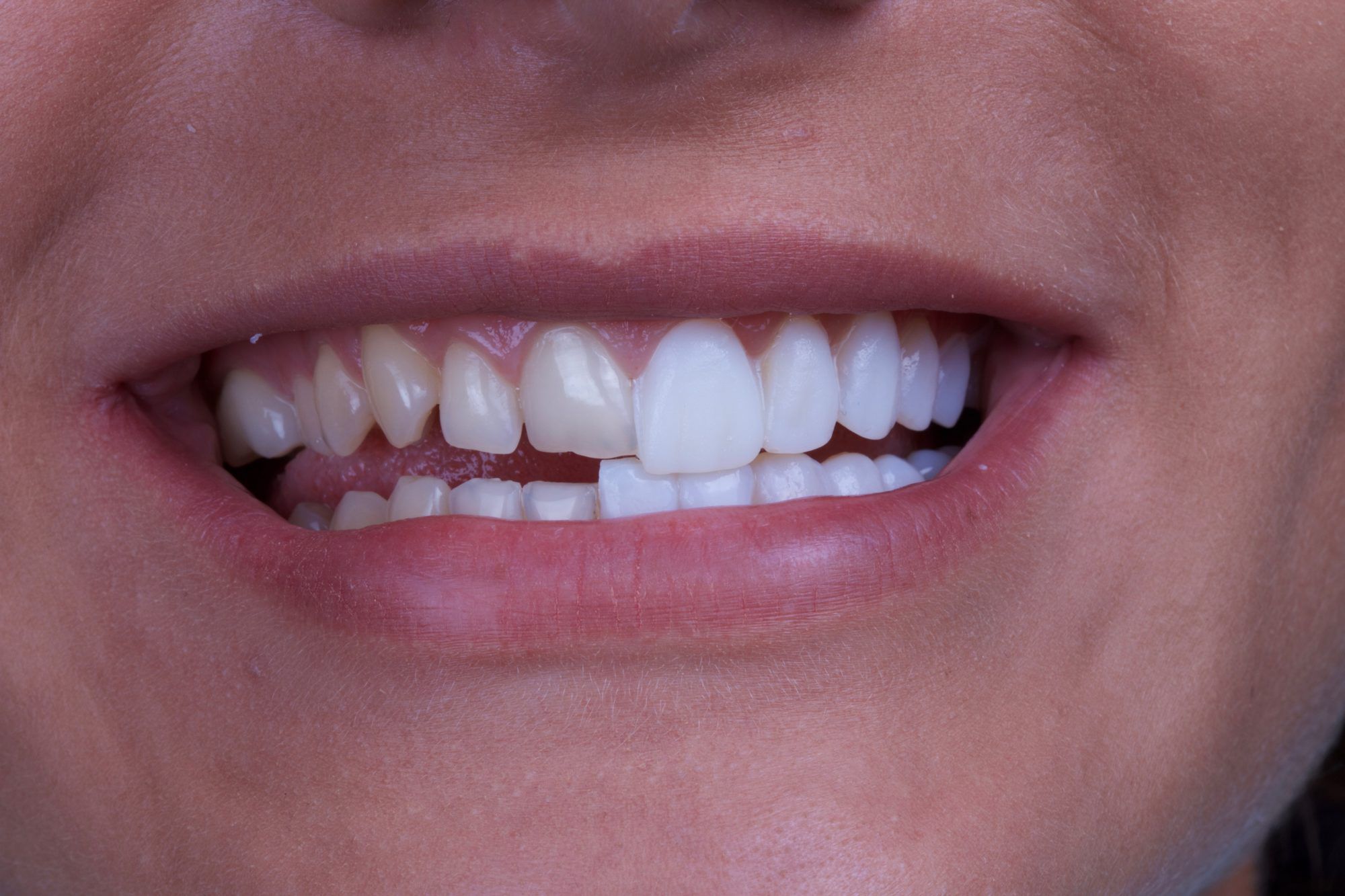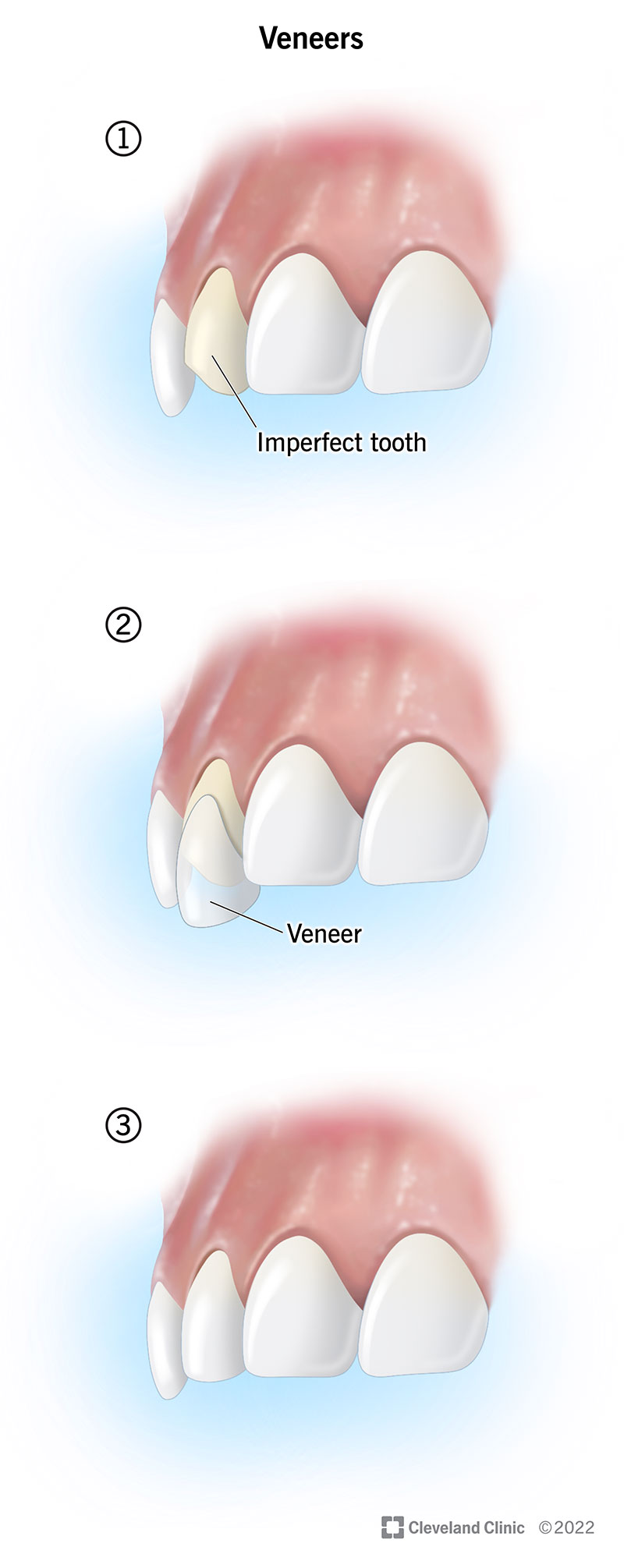The Complete Introduction of Veneers: Kinds, Makes use of, and Their Impact on Your Smile
Veneers function as a preferred service for people looking for to enhance their oral looks. These custom-crafted coverings can properly mask imperfections such as staining and voids. With two key types readily available, porcelain and composite material, each offers unique advantages and restrictions. The effect of veneers extends past mere look, influencing self-confidence and social communications. Understanding their advantages and kinds is necessary. What might this suggest for one's total high quality of life?
Recognizing Veneers: What They Are and Exactly how They Work
Veneers are slim coverings, generally made from porcelain or composite resin, that are custom-crafted to fit over the front surface area of teeth. They offer both visual and functional functions, giving a service for different dental imperfections such as discoloration, gaps, and minor misalignments. By sticking to the tooth enamel, veneers produce an all-natural look while enhancing the form and shade of the teeth.
The procedure usually includes an initial appointment, where a dental professional evaluates the individual's needs and talks about preferred outcomes - Porcelain Veneers Dentist. Following this, a marginal quantity of enamel may be eliminated to accommodate the veneer. Perceptions of the teeth are then required to assure a specific fit. When made, the veneers are adhered securely to the teeth utilizing a special oral adhesive. This treatment not only boosts the smile's look but additionally aids secure the underlying teeth from additional damages, making veneers a preferred option for several seeking a smile transformation
Kinds of Veneers: Porcelain vs. Composite Material
The distinction in between porcelain and composite resin veneers hinges on their material structure and features. Each type provides differing levels of durability, expense, and longevity, affecting patients' options based on their individual needs. Comprehending these distinctions is essential for making an educated choice relating to dental improvements.
Material Differences Described
While both porcelain and composite resin veneers serve the very same cosmetic purpose, they differ considerably in product buildings, durability, and aesthetic outcomes. Porcelain veneers are crafted from a ceramic material that simulates the all-natural translucence of teeth, supplying a realistic appearance. Their smooth surface area is immune to discoloration, making them an appealing alternative for those seeking a resilient aesthetic. On the other hand, composite resin veneers are made from a tooth-colored plastic material, offering convenience and simplicity of application. However, they may not accomplish the same degree of illumination or clarity as porcelain. In addition, composite veneers can be more quickly formed and fixed, making them a much more versatile alternative in particular dental circumstances. Each type presents distinct benefits customized to private choices.
Long life and Durability
When comparing porcelain and composite resin veneers, long life and longevity are considerable variables. Porcelain veneers are recognized for their stamina, commonly long lasting 10 to 15 years with appropriate treatment. Their strength against cracking and staining makes them a preferred choice for individuals seeking long-lasting results. On the other hand, composite material veneers normally have a much shorter life expectancy, balancing 5 to 7 years. While they can be repaired extra conveniently if harmed, they are a lot more susceptible to use and staining in time. The choice between these products frequently depends on the person's lifestyle, aesthetic goals, and maintenance choices. Inevitably, comprehending the distinctions in long life and toughness can direct patients in selecting the veneer kind that finest matches their needs.
Cost Comparison Insights
When choosing between porcelain and composite material veneers, expense is a vital consideration. Porcelain veneers typically range from $800 to $2,500 per tooth, reflecting their resilience, aesthetic allure, and resistance to staining. These veneers need an extra comprehensive procedure and specialized lab work, contributing to their higher cost tag. On the other hand, composite material veneers are typically a lot more affordable, setting you back between $250 and $1,500 per tooth. They can be applied in a single go to, which lowers labor prices. However, composite veneers may require a lot more regular substitutes, possibly raising lasting expenditures. Ultimately, the choice between porcelain and composite material veneers relies on specific budgets and wanted end results, balancing preliminary expenses against long life and visual outcomes.
The Benefits of Finding Veneers for Your Smile
Choosing veneers supplies significant benefits for those looking for an improved smile. Their enhanced aesthetic appeal can change the appearance of teeth, while their stain-resistant homes ensure a lasting illumination - Porcelain Veneers Dentist. This combination makes veneers a popular option for people wanting to achieve a remarkable smile
Enhanced Visual Allure
When people look for to boost their smiles, veneers often become a popular service because of their transformative aesthetic benefits. These slim coverings, generally made of porcelain or composite material, can effectively hide blemishes such as chips, spaces, and misalignment. By resembling the natural appearance of teeth, veneers provide a smooth, glowing smile. Their personalized nature enables for a tailored strategy, enabling people to select shades and shapes that finest match their face attributes. In addition, veneers can create an uniform look, boosting overall facial balance. This visual improvement not only boosts self-confidence yet can likewise favorably affect individual relationships and social communications, making veneers a popular option for those aiming to accomplish a brighter, much more attractive smile.
Discolor Resistance Conveniences
Veneers not just enhance visual allure yet additionally provide considerable tarnish resistance, making them an appealing option for individuals worried about keeping an intense smile. Composed of resilient products such as porcelain or composite material, veneers are less porous than natural teeth, which helps protect against the absorption of spots from usual offenders like coffee, tea, and merlot. This fundamental tarnish resistance permits people to enjoy their favorite beverages without stressing over staining. What Are Veneers. Additionally, the smooth surface area of veneers makes them simpler to clean, more see this site improving their durability and keeping their excellent look. Consequently, veneers give a functional option for those looking for both elegance and capability in their dental treatment
The Refine of Obtaining Veneers: What to Expect

The process of obtaining veneers may appear challenging, understanding the actions entailed can ease problems. Initially, an assessment with a dental practitioner is required to identify if veneers are the appropriate remedy for the individual's dental issues. Throughout this visit, the dental expert will certainly go over desired results and take impacts of the teeth.
Next, a second visit is arranged for tooth prep work, where a little amount of enamel is usually removed to fit the veneers. Short-term veneers may be positioned while the customized ones are crafted in an oral lab, which typically takes a pair of weeks.
As soon as ready, the dental practitioner will certainly position the veneers, making certain correct fit and color before bonding them to the teeth utilizing an unique adhesive. After final changes, the dental practitioner will give advice on care. Understanding these actions can help people feel more comfy and notified throughout the veneer process.
Maintenance and Look After Your Veneers
Preserving veneers requires consistent like assure their longevity and appearance. Proper dental hygiene is vital; brushing two times daily with a non-abrasive tooth paste and flossing routinely help avoid plaque build-up around the veneers. In addition, regular dental exams are crucial for keeping an eye on the problem of the veneers and addressing any kind of prospective problems early.
People should prevent difficult foods and extreme pressure when biting to avoid damages. It's also suggested to restrict usage of staining substances, such as coffee, tea, and red wine, as these can impact the veneers' color gradually.

Transforming Your Smile: Real-Life Impact of Veneers
A radiant smile can greatly improve one's confidence and overall appearance. For several people, veneers offer as a transformative remedy, efficiently attending to different dental problems such as discoloration, gaps, and misalignment. These slim coverings, tailor-made to fit over the front of the teeth, can develop a harmonious and cosmetically pleasing smile.
Real-life situations highlight the profound effect veneers can have. Individuals usually report a prompt boost in self-confidence and social interactions following their procedure. The newfound self-confidence can bring about more opportunities in personal and specialist life, as individuals really feel more like it inclined to engage and express themselves.
In addition, the emotional advantages expand past simple appearance; many experience improved psychological health as they embrace their smiles. Veneers not just boost physical qualities yet likewise add considerably to total quality of life, underscoring their value in cosmetic dental care.
Regularly Asked Inquiries
Exactly How Lengthy Do Veneers Typically Last Prior To Requiring Replacement?
Veneers usually last between 10 to 15 years prior to requiring replacement. Aspects such as oral health, dental practices, and the type of product utilized can affect their long life and general sturdiness. Regular oral exams are advisable.
Can Veneers Be Gotten Rid Of, and if So, Just how?
Yes, veneers can be removed. A dental expert usually makes use of specific tools to thoroughly remove them from the teeth, guaranteeing marginal damage to the underlying enamel, frequently adhered to by necessary modifications or reconstructions for ideal visual appeals.
Are Veneers Suitable for Everyone's Oral Condition?

Will Getting Veneers Pain or Require Anesthesia?
Obtaining veneers usually includes minimal pain, and several people receive neighborhood anesthetic to ensure a pain-free experience. Level of sensitivity may occur momentarily later, yet the majority of locate the process tolerable and are satisfied with the results.
Just How Do Veneers Affect Tooth Level Of Sensitivity After Positioning?
Veneers can temporarily boost tooth sensitivity because of the elimination of enamel and the bonding procedure. The majority of people experience a reduction in sensitivity gradually as the teeth adapt to the brand-new veneers.
Veneers are slim shells, usually made from porcelain or composite material, that are custom-crafted to fit over the front surface area of teeth. Porcelain veneers are crafted from a ceramic material that resembles the natural translucence of teeth, offering a natural look. Porcelain veneers typically range from $800 to $2,500 per tooth, showing their longevity, aesthetic appeal, and resistance to staining. In contrast, composite material veneers are generally extra economical, costing between $250 and $1,500 per tooth. Composed of durable materials such as porcelain special info or composite resin, veneers are much less porous than natural teeth, which assists avoid the absorption of discolorations from common offenders like coffee, tea, and red wine.